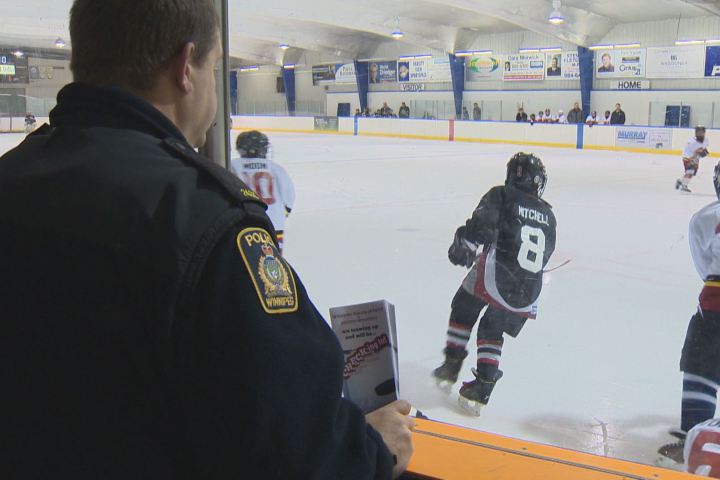
Courtesy of Global News Winnipeg
Economist questions benefits of police patrols at minor hockey games
The following post is from Hockey Night in Headingley, a blog created and maintained by University of Manitoba economics professors and hockey parents, Ryan and Janice Compton.
Evaluating police patrols at minor hockey games
I have taught the first year university course “Introduction to Microeconomics” for ten years. My one goal in the very first class each year is to instill in the students one key principle of economics — nothing is free. There is opportunity cost associated with everything we choose to do and we must always consider alternatives when deciding how to allocate our scarce resources. Further, when considering costs and benefits, we should focus on the marginal (additional) costs and benefits.
I was reminded of this when I read today in the Winnipeg Free Press that police officers from the Winnipeg Police Services community relations department will be dropping in on minor hockey games during the year. Their goal is twofold — first, to educate parents about fair play and respect in sport and second, to provide a deterring presence against abusive behaviour. Comments from WPF readers alternated between those thinking this is a great idea, and those commenting that it is a wasteful use of police resources.
Is this a good use of the city’s resources? To answer this, we need to ask whether the marginal benefit of the police presence at the rinks outweighs the marginal cost. Consider the first goal — education. One parent from every family in Winnipeg minor hockey was obligated to complete a one-hour on-line course in Respect in Sport before they could register their child this year. Will the police be handing out pamphlets to anyone who has not already been made aware of the expectations of parents? I don’t think so. In terms of the second goal, although they gain a lot of media attention, there are a handful of incidents each year that lead to abusive behaviour. Will a police officer curb a hockey dad from yelling instructions to his son during the game? Should they? While it may not be good parenting, incidents reaching the level of negative behaviour that would justify police intervention are rare. It is difficult to believe that there will be a high marginal benefit of the program.
Perhaps the marginal cost of the arena visits is also low, I’m not sure. The question is, what would these officers be doing if not at the rinks. They are part of the community relations department so likely they are not out patrolling high-risk areas, but there is an alternate use of their resources. To properly evaluate whether there should be police officers at the rinks, one needs to know this information. My gut reaction is that monitoring hockey parents can’t be the best use of resources, but in the end it will all be left to speculation.
Unfortunately we will never be able to measure the costs and benefits, never be able to tell if the programs are successful. Public policies should be designed in a way that allows for their evaluation. In this case, though, both programs – the obligatory Respect in Sports program and the police arena patrols — are rolled out in the same year. If there is any measurable reduction in abusive hockey behaviour, the source of the reduction will be unknown. For this reason it is likely that we will continue spending resources on both programs without ever knowing if either is beneficial.
This post was originally published on Oct. 30., 2014, on Hockey Night in Headingley






